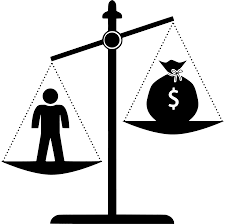
I felt this question needed some serious attention after someone asked me this last week. This question came to me because the individual asking was denied a consolidation loan.
There are many different ways to get out of debt besides a loan. The quickest and simplest way to answer this question is…a debt management program.
Let’s discuss the different types of debt management programs available.
What Is True the Definition of Bad Credit
If you have bad credit you know most of these but let’s highlight them anyway.
- Very high interest rates on loans and credit cards (25% or more)
- Smaller Loan/Credit card limits offered ($1,000 or less)
- You are flagged as high risk on your credit history making it impossible for you to be approved for any type of credit line.
This isn’t a very long list but these 3 items can make life very hard. Who wants a car loan interest rate of 35%?
If you fall behind on payments for one month you’ll never catch up. This happened to a friend of mine. Things got so bad he filed for bankruptcy and trashed his credit history even more.
The good news is you can still pay off your debt and improve your credit.
Want to know how?
Debt Management Program Options
Let’s look at the short list and then go into detail of each:
- Hardship Programs
- Debt Settlement
- Debt Management Program with a financial coach
***All of these mention negotiation of some type. Make sure to always get a response from the company prior to making the first payment to prevent them from backing out of a verbal agreement.
Hardship Programs:
Did you know that the credit card companies offer hardship programs?
They don’t advertise it but they are there.
All you have to do is call them for details or go to your credit card company’s website and enter “hardship program” in the search box.
This will take you to a location on their website explaining how to get details.
I have a credit card with Chase; I discovered they offer several options to fit your financial needs. Companies just want to know they are going to get their money.
Don’t hide your struggles from them; use them to negotiate.
Chase’s hardship program has options such as:
a) Waiving over-limit and late fees.
b) Restructure your credit card balance to reduce the interest rate to make the monthly payments more affordable.
c) They could even extend customer repayment terms.
They could offer you one or all of the above depending on your situation. Here is the catch though they may suspend your ability to use that credit card until the balance is paid in full.
But if they reduce your interest rate to make your monthly payments lower wouldn’t it be worth it?
Keep in mind that if you miss one payment this arrangement will be null and void.
Meaning they could switch you back to the original terms and come after you for the fees they waived.
[mc4wp_form id=”77″]
Debt Settlement:
Despite popular belief you can settle your own debt without a lawyer taking all of your money. I usually recommend taking this route if you have missed several months of payments.
I met someone who was extremely stressed out about her credit card bills. Let’s call her Sally to make the retelling of this story simpler.
Sally had lost her job and naturally stopped paying the credit card bills in order to pay her mortgage, utilities, and food. She prioritized I get it!
Sally had 6 credit cards in total that she hadn’t paid in 3 months at the time of our conversation.
She was receiving phone calls as well as letters in the mail. Credit card companies will do anything, say anything, and everything in order to scare you into paying your bill.
But here is another secret, credit card companies don’t want to carry a bad debt account into a new calendar year.
If they have enough of them on their books it looks bad to investors causing their market shares to decrease in value.
Back to the story, Sally needed to put each company in a position to where they were willing to settle the account for less than the full amount she owed.
This required her to start answering those phone calls as well as sending certified mail responses to each company explaining her dire situation. The certified mail would keep a record confirming the company received it.
The idea was each company needed to be made aware she was out of a job and was barely making ends meet.
Emphasizing on how bad her hardship was. Sally continued to do this for another 3 months. Each phone call was something like, “no, I’m sorry I don’t have any money to pay you. I’m still struggling to find a job. The market isn’t what it used to be.”
The reason I wanted her to negotiate the settlement in the 6 month was because this is usually when credit card companies decide to sell the debt off to a collection agency.
At that point, Sally arranged a phone call with each company stating, if the company was willing to take (for example) 60 cents on the dollar she could borrow the cash from a family member to pay off the company for that amount.
She emphasized that it was impossible for her to borrow enough to pay off the full balance; if they asked.
The other negotiation tactic is telling the company she could only afford to pay a certain dollar amount in cash to the company to clear the debt.
You would want to emphasize on the fact that you have no idea when you’ll be able to find a job and this is the best you could do.
Credit card companies are willing to negotiate deals like this with individuals because they will earn less than 50 cents on the dollar when they sell the bad debt account to a collection agency.
For example, they’d rather earn $3,000 (0.60 x 5000) from a $5,000 account rather than $2,000 or less.
Between all 6 credit card accounts this Sally was able to settle all of her credit card debts for $20,000 less than what she owed.
Granted these debt settlements will remain on her credit history for 7 years giving her a bad credit score rating.
But her credit score was dropping every month she couldn’t pay the debt. Now she has the outstanding balances removed and only has her credit score to speak for itself.
She was able to pay each company in cash by borrowing the money from her retirement account. After 8 months of job hunting Sally was able to find another job.
You have to be very careful when planning your financial future. It is very unlikely finding a new job after a layoff will be quick.
On average it does take 8 months or more.
Also be aware, debt settlement is only a good option if you are behind on all of your credit card payments.
If you make payments on another credit card or occasionally make payments on the one you want to negotiate the company isn’t going to budge.
To then it appears as if you are intentionally not paying them and they won’t see it as a hardship. This is one of those situations where it is all or nothing.
[mc4wp_form id=”77″]
Debt Management Programs:
This is an option where you have a financial coach helping you create your pay off plan for your credit cards and guide you throughout the entire negotiation process.
They also state to expect this process to take 3-5 years to complete. These types of programs usually require you to be $15,000 in credit card debt or more for you to qualify.
This is similar to the hardship program but someone is doing the negotiation for you.
Also your payments are going to a 3rd party rather than to each individual company.
The 3rd party purchases all of your debts, consolidates all of them into one monthly payment, and offers you a lower interest rate.
It is also similar to a consolidation loan.
However, the participants have to agree to use zero credit cards while on this program. If a new credit card charge appears on your credit history or an attempt to open a new credit card account; it will void your arrangement.
Interest rates 25% to 30% that had been lowered to 8% during negotiation could go back to what they were.
But if you are in over your head wouldn’t this be worth it in the long run?
The idea is to get you out from under the water so you can start enjoying life again instead of being a slave to bill collectors.
Your stress level will shrink as well!
Concluding Thoughts
If you have bad credit the best options to get you out of debt are hardship programs, debt settlement, or debt management programs.
Some of these options, such as the debt settlement, could stay on your credit history for 7 years. This will make you a high risk borrower meaning higher interest rates and lower borrowing limits.
Regardless of the option you take, there is a catch to all of it.
If you are able to negotiate lower interest, lower repayment amount, or lower payments. If you miss one payment or deadline you will void the new arrangement.
Be very diligent with making payments on time.
Also, get the agreement in writing from the credit card companies before making the first payment. This covers you to make sure they hold up their end of the agreement.
These companies will stop at nothing to collect all of their money.
***
Do you have a question you would like an answer to but can’t seem to get a straight answer?
I would be happy to help. The blog you read today was created to answer another reader’s question. I created this blog in order to use my 8 years of accounting experience/knowledge to help you understand your finance questions.
You can either subscribe below then click reply to the welcome email to ask your question or email me at ask@howtobudgetnow.com.
If you subscribe you will not only receive my newest blog by email every Wednesday but you will also get a free copy of my ebook teaching you how to make more money without a raise or a second job.
I can’t wait to hear from you!
[mc4wp_form id=”77″]
Subscribe and you'll receive our weekly posts right in your inbox. You'll also be one of the first to be notified when our free budget course opens. Hope to see you there!




